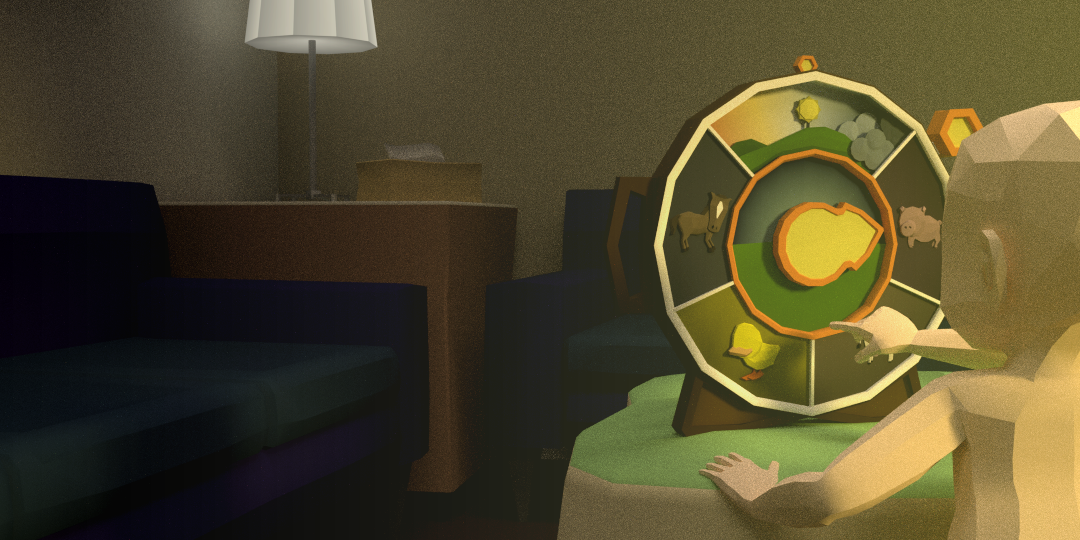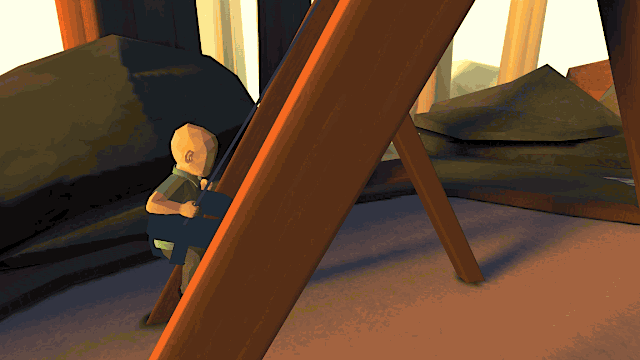Joel Evan Green was diagnosed with a brain tumor at only twelve months of age. Doctors gave him four months to live. But he exceeded all medical expectations greatly, battling through multiple surgeries and another seven tumors. He lived on, strong, inside the sphere of love that his family had surrounded him in. They prayed, sung, and played with him, and Joel smiled back in the way that only infants can when experiencing pure joy.
When Joel was four years old, Ryan and Amy Green, his parents, started to recount their journey with Joel in a videogame. Prior to this, they had released a picture book based on their story called “He’s Not Dead Yet.” The book details in some part how the Greens had been stuck walking a line between life and death for, at that point, a whole two years.
a message that he had been preparing himself to write for four years.
The videogame, titled That Dragon, Cancer, started off similarly as a way to recount the events that the Greens’ had been through together. Using the point-and-click format, poetry, voiceovers, and low-poly artwork, That Dragon, Cancer invites players to experience what it was like sitting up all night with Joel in a children’s hospital as he cried. But it also gives a sense of how it feels to play with him, to hold him in your arms, and to love him. There’s more happiness, hope, and love than there is sorrow and pain.
On March 13th 2014, Ryan posted a photo to the game’s development blog with a message that he had been preparing himself to write for four years. “Joel took his last breath at 1:52am,” it reads.
Unequivocally, this has had a huge impact on the family, and with them the very fundamentals of That Dragon, Cancer also changed. The initial aim of those working on the game had been to translate a very specific experience into a form that others could grok. But that experience, the journey, was continually being added to with every passing day, it was ongoing; Joel was still alive. With his passing, Ryan and Amy now see That Dragon, Cancer as a love letter to their son. And it has become clear that a videogame is the most appropriate expression of this due to how the medium brings sounds, sights, and interaction together.
“I get to gather what remains of Joel in the form of videos and recordings and memories and encode them into an experience that I can share with others. I get to invite others to play with Joel in the only way I am able. That is a tremendous gift to me,” Ryan told me.
to create a digital facsimile of Joel for everyone to cherish
Everything in That Dragon, Cancer is based upon interacting, or playing, or holding Joel. So while he may have left the physical realm, he lives on inside this videogame in digital form as a low-poly boy that anyone can connect with. Taking this recreation further, the team started to animate Joel’s mannerisms, and input his voice by extracting it from home video recordings, as well as encode his favorite things into the game. “In one scene that I am really excited about, Joel and the player get to escape the bounds of the hospital, and get swept up into something that is both fantastic and magical and whimsical and full of wonder and many of Joel’s favorite things,” Ryan said.
As it has matured, That Dragon, Cancer has become more than the Greens’ story. As it was displayed at various events around the world, the way it explores the universal themes of life, love, and death saw it inciting others to reflect upon their own lives and relationships. These people shared tears as they told their own stories of loss and love after playing the preview builds—when the Dragon had visited them, as it does many—and so it went that That Dragon, Cancer had already reached out beyond its original scope.

What emerged alongside the increased effort to create a digital facsimile of Joel for everyone to cherish, was a desire to bring in the stories of others who had also faced death, illness, and other personal struggles. And so, this is no longer a videogame made only as a tribute to a brave little boy, but one that also acknowledges that the family’s story is mirrored in the lives of many others.
“When we were in the hospital with Joel, it didn’t take long to realize we were one of a hundred other families battling illness in some form. We want our game to give the players a similar realization that Joel’s story does not take place in isolation, but is simply one of many all too similar stories playing out in hometowns all over the country,” Ryan told me.
“I hope it enables people to love more deeply and mourn more completely”
This desire to bring in more peoples’ stories into That Dragon, Cancer is partly why Ryan, Amy, and the rest of the team have taken the game to Kickstarter. With crowdfunding, they’re able to use the backer rewards to find the people that have those stories they’re after and to have them included in the game, while also acquiring the money needed to make it happen.
“There are scenes in our game when the player is walking the halls of the oncology floor, they’re listening to the sounds of the clinicians and doctors pass them by at all hours of the night, overhearing the conversations held behind closed doors as they pass by,” Ryan told me. “And we want the player to be able to see art on the hospital wall from other players, people just like them, players who have struggled and overcome or lost. Players with their own stories, no less valid than the one we are exploring.”

Ryan told me that he hopes those that choose to add their voice to the game will contribute portraits of loved ones, depictions of hopes and fears, prayers and wishes expressed in their own journeys, or compositions to share the “sublime beauties of life.” There is a strict rule against branding, promotional materials, and anything that uses hatred, discrimination, and obscenities. “My hope is that collectively, as artists, we can express love,” Ryan said.
Although there is sad prose and piano music in That Dragon, Cancer, to give insight into the harder times of the Greens’ past five years, the intention is to make a game that celebrates Joel and anyone who means a lot to us. To accomplish that, it must be a game filled with love in all its forms. “I hope it enables people to love more deeply and mourn more completely and behold profound beauty and find rest in the midst of the mystery of this life even if only for a few hours,” Ryan said.
“My hope is that collectively, as artists, we can express love”
Ryan and his team want the game to touch as many as people as possible, and it’s here that the game hits a potential snag. It was agreed that That Dragon, Cancer would launch exclusively on OUYA in exchange for funding back in 2013. It was the right choice for the team at the time, but with the game being put on Kickstarter hoping to acquire the support of many, the OUYA exclusivity seemed potentially limiting. Thankfully, the people at OUYA fully understood the desires of the team and wanted to support them. That’s why they have allowed the game’s exclusivity to be broadened so that it may launch on Windows and Mac at the same time.
With everything in place, it’s up to everyone else out there to come together and show support for That Dragon, Cancer and everything it speaks to. As someone touched by the Greens’ story, and having also lost my younger brother when he was only two years old, I find myself grateful, surprised, and sometimes brought to tears just by the idea that a videogame like this could exist.
Hopefully, it will. Ryan reckons that all it takes is a little bit of trust and hope. That’s what has got him and his family through their testing and emotional journey so far. “My hope is that folks will take time to walk with us for a bit, and that they’ll find the experience added something to their life,” he says.





